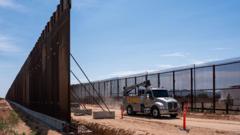In a significant move for trade relations, Canada plans to drop some retaliatory tariffs against US goods, only maintaining those on autos, steel, and aluminum. This decision aims to align trade with ongoing negotiations and will take effect on September 1st.
Canada Eases Tariffs on US Goods Amid Ongoing Trade Negotiations

Canada Eases Tariffs on US Goods Amid Ongoing Trade Negotiations
Prime Minister Mark Carney announces a reduction in retaliatory tariffs on US imports while keeping key levies in place.
From a timeline that explores the intricate dance of trade dynamics, Canada has made a pivotal decision concerning its retaliatory tariffs on US imports. Prime Minister Mark Carney, speaking on Friday, announced that the country would reduce tariffs on a range of American goods, while retaining hefty levies on automobiles, steel, and aluminum.
This announcement follows a recent phone conversation between Carney and US President Donald Trump, marking their first communication since the two nations missed a deadline to finalize a trade agreement. The implementation of these changes is set for September 1, as Canada looks to match the US's stance by removing tariffs on goods that adhere to the US-Mexico-Canada Agreement (USMCA).
Previously, Canada had imposed a 25% tariff on US goods valued at roughly C$30 billion (approximately US$21.7 billion), affecting everyday items like orange juice and household appliances. Carney emphasized that this move will restore free trade for a vast majority of traded items and is vital for maintaining competitive advantages in Canadian industries.
The White House responded positively, labeling Canada's decision "long overdue," and highlighting a readiness to continue discussions on relevant trade and national security issues. Trump echoed the sentiment during a press briefing, informing media that further conversations with Carney are expected shortly.
Despite the shift, criticism emerged from Conservative leader Pierre Poilievre, who accused the Prime Minister of retracting previously firm trade negotiations, suggesting a loss of assertiveness. He branded the decision as a "capitulation," questioning Carney's aggressive trade approach during his recent election campaign.
Carney defended the tariffs strategy, asserting that Canada's existing arrangements with the US resulted in a lower effective tariff rate compared to many other countries, which averaged around 16%. He underscored the necessity to preserve this unique advantage for Canadian businesses and workers while addressing the ongoing complexities in trade discussions, particularly regarding autos, steel, aluminum, and lumber.
With significant tariffs still imposed by the US, including a 50% levy on steel and aluminum imports except for those from the UK, and Canada's counter-tariffs on US steel and aluminum, industry leaders remain vigilant. Economists warn that such tariffs disrupt the Canadian supply chain, particularly affecting manufacturing sectors and job stability. The Canadian province of Ontario, known for its auto industry, reported substantial job losses in recent months, underscoring the interconnectedness of North American trade and manufacturing processes.
As negotiations continue ahead of a USMCA review scheduled for next year, both Canada and the US are navigating a complex trade landscape shaped by ongoing tariffs and political rhetoric.
This announcement follows a recent phone conversation between Carney and US President Donald Trump, marking their first communication since the two nations missed a deadline to finalize a trade agreement. The implementation of these changes is set for September 1, as Canada looks to match the US's stance by removing tariffs on goods that adhere to the US-Mexico-Canada Agreement (USMCA).
Previously, Canada had imposed a 25% tariff on US goods valued at roughly C$30 billion (approximately US$21.7 billion), affecting everyday items like orange juice and household appliances. Carney emphasized that this move will restore free trade for a vast majority of traded items and is vital for maintaining competitive advantages in Canadian industries.
The White House responded positively, labeling Canada's decision "long overdue," and highlighting a readiness to continue discussions on relevant trade and national security issues. Trump echoed the sentiment during a press briefing, informing media that further conversations with Carney are expected shortly.
Despite the shift, criticism emerged from Conservative leader Pierre Poilievre, who accused the Prime Minister of retracting previously firm trade negotiations, suggesting a loss of assertiveness. He branded the decision as a "capitulation," questioning Carney's aggressive trade approach during his recent election campaign.
Carney defended the tariffs strategy, asserting that Canada's existing arrangements with the US resulted in a lower effective tariff rate compared to many other countries, which averaged around 16%. He underscored the necessity to preserve this unique advantage for Canadian businesses and workers while addressing the ongoing complexities in trade discussions, particularly regarding autos, steel, aluminum, and lumber.
With significant tariffs still imposed by the US, including a 50% levy on steel and aluminum imports except for those from the UK, and Canada's counter-tariffs on US steel and aluminum, industry leaders remain vigilant. Economists warn that such tariffs disrupt the Canadian supply chain, particularly affecting manufacturing sectors and job stability. The Canadian province of Ontario, known for its auto industry, reported substantial job losses in recent months, underscoring the interconnectedness of North American trade and manufacturing processes.
As negotiations continue ahead of a USMCA review scheduled for next year, both Canada and the US are navigating a complex trade landscape shaped by ongoing tariffs and political rhetoric.




















